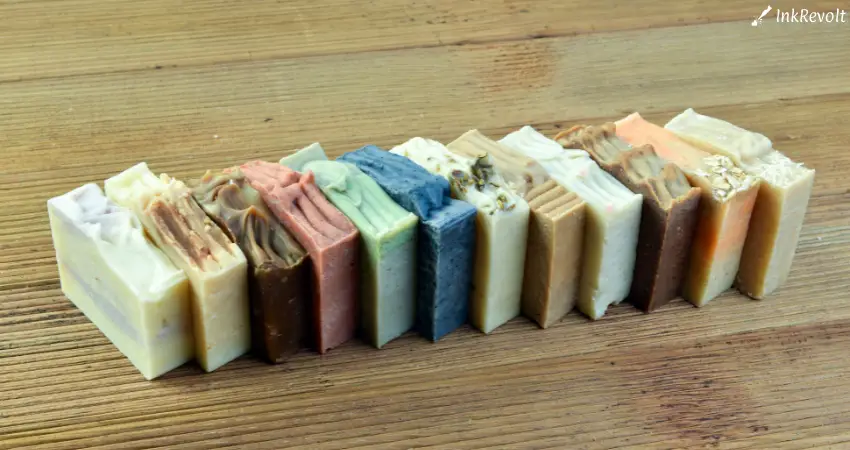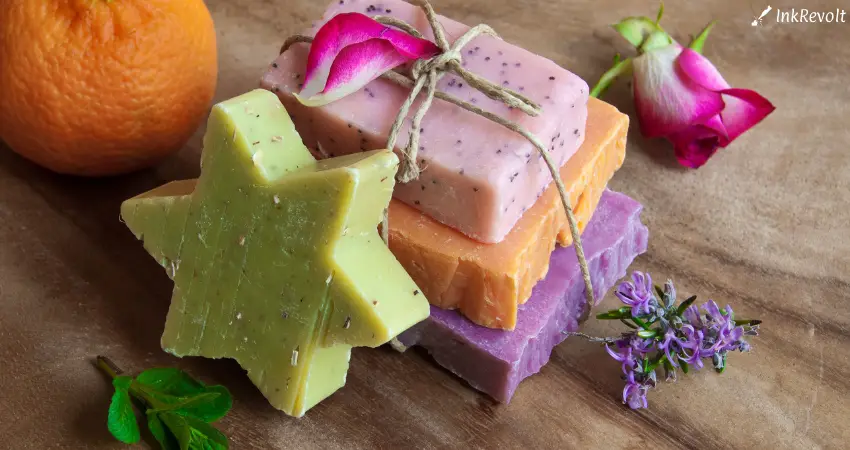Can You Use Scented Soap On A Tattoo?
One of the most common questions that arise during the aftercare process is whether scented soap can be used on a tattoo. With so many types of soaps available on the market, it’s easy to become confused about which ones are safe to use on a new tattoo. So, can you use scented soap on a tattoo?
It’s best to avoid using scented soap on a tattoo. First, scented soaps can contain harsh ingredients that may irritate your skin. Additionally, fragrances can interfere with the healing process by introducing new substances to the tattooed area. It’s best to stick with a mild, unscented soap or green soap for the first few weeks after getting a tattoo.
In this article, we will explore whether scented soap can be used on a tattoo, the potential risks associated with using it, and what alternative options are available for keeping your new tattoo clean and healthy.
When Can You Use Scented Soap On A Tattoo?

Using a scented soap on fully-healed tattoos is considered safe. The healing process of a tattoo can take anywhere from 2 to 4 weeks or even longer, depending on the size and complexity of the tattoo, and the healing rate of your body.
During the initial healing process, try your best to avoid using any products that contain fragrances, dyes, or chemicals as they can cause skin irritation or allergic reactions, which can delay the healing process and cause complications.
Scented soaps can also strip the skin of its natural oils and moisture, making it dry and itchy. This can be detrimental to the tattooed area, as the skin needs to stay hydrated and nourished during the healing process to avoid scarring and discoloration.
Try to pick a gentle, fragrance-free soap during the initial healing process.
After the first 2-3 weeks, if your tattoo has healed properly, and you don’t experience any itching, irritation, or redness, you may start using scented soaps, but it’s always best to consult with your tattoo artist or dermatologist to ensure that your tattoo is fully healed and ready for scented soap.
It’s important to be patient during the tattoo healing process and follow the aftercare instructions provided by your tattoo artist. Using scented soap on a new tattoo should be avoided until the tattoo has fully healed and there are no signs of irritation or allergic reactions.
Can You Use Scented Antibacterial Soap On A New Tattoo?

Well, using scented antibacterial soap on a new tattoo is never a good idea. While antibacterial soap can be beneficial in helping to prevent infection and keep the area clean, scented soaps can irritate the skin and lead to complications that may compromise the healing process of your tattoo.
Below are a few reasons why you may want to avoid using scented antibacterial soap on a new tattoo:
- Skin irritation: Scented antibacterial soaps can contain chemicals and fragrances that can irritate the skin, especially on a new tattoo. This can cause itching, redness, and discomfort. The tattooed area is already sensitive and prone to irritation, so it’s best to avoid using anything that could exacerbate the issue.
- Ink fading: The fragrance and chemicals in scented antibacterial soaps may interact with the ink on your new tattoo, causing it to fade or become discolored. This is especially true for vibrant, colorful tattoos, where any change in the ink’s appearance can be noticeable.
- Delayed healing: Using scented antibacterial soap on a new tattoo can also slow down the healing process. Irritation and skin damage can impede the healing process, leaving you with a tattoo that takes longer to fully heal.
What Should You Use Instead of Scented Antibacterial Soap?
Many tattoo artists recommend using a mild, unscented, and gentle soap specifically designed for tattoo aftercare. These products are formulated to clean and disinfect the area without causing any irritation or damage.
Additionally, they can help maintain the tattoo’s color and prevent scabbing or peeling, which can lead to scarring or loss of ink.
What Happens When You Use Scented Soap On A New Tattoo?

Using scented soap on a fresh tattoo can have negative effects on the healing process. Tattoos are essentially open wounds, and scented soap can cause irritation and dryness.
When scented soap is applied to a tattoo, it can cause the skin to become dry and itchy, which can lead to scabbing and potentially cause the ink to be removed. Additionally, the fragrance and chemicals in scented soap can cause allergic reactions, redness, and itching.
Scented soap contains perfumes and chemicals that can be harsh on sensitive skin, and the skin around a fresh tattoo is especially sensitive. The harsh chemicals can strip the skin of its natural oils, causing dryness and inflammation. This can make it harder for the tattoo to heal, and may even result in scarring.
What Happens If You Use Scented Soap On A Tattoo Regularly?
Using scented soap on a tattoo regularly can cause long-term damage to the tattoo and the skin. Over time, the harsh chemicals and fragrances can cause the ink to fade or even be removed completely. This can lead to an uneven, patchy tattoo that requires touch-ups or even removal.
Regular use of scented soap on a tattoo can also cause the skin to become dry and itchy, leading to scabbing and potentially causing the tattoo to become infected. Additionally, if the soap is not rinsed off thoroughly, it can leave a residue on the skin that can cause further irritation.
In conclusion, it is best to avoid using scented soap on a fresh tattoo, as well as on a healed tattoo. It is recommended to use a fragrance-free, gentle soap to cleanse the tattoo, and to avoid scrubbing the area too vigorously. This will help ensure proper healing and preserve the longevity and vibrancy of the tattoo.
What Does an Unscented Soap Do to Your Tattoos?

Although we’ve said a bit about unscented soap in the earlier sections, here are some detailed reasons why unscented soap is necessary for tattoos:
- Reduces Irritation: Unscented soap is free of harsh chemicals and fragrances that can cause skin irritation. This type of soap is mild and gentle on the skin, making it ideal for cleaning a new tattoo.
- Prevents Infection: Tattooing involves breaking the skin, which can make it vulnerable to infection. Unscented soap is effective in preventing the growth of bacteria and other microorganisms that can cause infection.
- Promotes Healing: Using unscented soap to clean a new tattoo helps to keep the area clean, and free from dirt and bacteria, and promotes healing. The soap does not interfere with the natural healing process and does not cause any adverse reactions.
Some other benefits of using unscented soap for tattoos:
- It is gentle on the skin: Unscented soap is gentle on the skin, making it an excellent choice for people with sensitive skin. The soap does not contain any harsh chemicals or fragrances that can cause skin irritation.
- It does not interfere with the natural healing process: Using unscented soap to clean a new tattoo does not interfere with the natural healing process. The soap helps to keep the area clean and free from bacteria, which promotes healing.
- It reduces the risk of infection: Unscented soap is effective in reducing the risk of infection in a new tattoo. The soap helps to kill bacteria and other microorganisms that can cause infection.
- It is readily available: Unscented soap is readily available in stores, making it easy to find and purchase.
What If I Don’t Have Unscented Soap For My Tattoo?
If you don’t have unscented soap for your tattoo, it is advisable to avoid using any soap that has fragrances or artificial coloring. This is because fragrances and artificial colors can irritate the skin, leading to inflammation and redness, which can affect the healing process of the tattoo.
If you do not have unscented soap, you can opt for a mild or natural soap that is free from harsh chemicals and fragrances. Examples of natural soaps include castile soap, oatmeal soap, and goat milk soap. These soaps are gentle on the skin and are less likely to cause any adverse reactions.
Alternatively, you can clean your tattoo with warm water and a clean cloth. Gently dab the tattooed area with the cloth, being careful not to rub or scratch the skin. Once the tattoo is clean, you can pat it dry with a clean towel.
It is important to keep your tattoo clean and dry to avoid the risk of infection. If you experience any signs of infection, such as redness, swelling, and pus, seek medical attention immediately.
How to Choose The Right Soap for My Tattoos?
Choosing the right soap after getting a new tattoo is crucial for proper healing and maintaining the vibrancy of the tattoo. Here are some factors to consider while choosing the soap:
- Mildness: After getting a new tattoo, the skin becomes sensitive, and it is essential to choose a mild soap that won’t irritate the skin. Avoid using soaps with harsh chemicals, fragrances, or dyes that can cause irritation, itching, or burning.
- Antibacterial properties: Tattooing creates tiny wounds on the skin that need to be protected from infections. Choose a soap that has antibacterial properties to prevent bacterial growth on the tattooed skin. Antibacterial soaps kill bacteria and keep the skin clean, which is vital for healing.
- Natural ingredients: Natural soaps with ingredients like aloe vera, chamomile, lavender, or tea tree oil are gentle on the skin and promote healing. These ingredients soothe and calm the skin, reduce inflammation, and accelerate the healing process.
- pH balance: The skin has a natural pH level of 5.5, and it is essential to choose a soap that has the same pH balance. Using a soap that has a different pH balance can disturb the natural protective barrier of the skin, leading to dryness, itching, or redness.
- Moisturizing properties: Tattooed skin needs hydration to heal correctly and maintain its vibrancy. Choose a soap that has moisturizing properties to keep the skin hydrated, prevent peeling, and protect the tattoo from fading.
Which Ingredients in Soaps Are Bad for Tattooed Skin?
Soaps that contain harsh chemicals and fragrances can be harmful to tattooed skin. The following ingredients should be avoided:
- Sulfates: Sulfates are often found in soaps and can strip the skin of its natural oils. This can cause the tattoo to dry out, fade, and even cause irritation.
- Fragrances: Artificial fragrances can irritate tattooed skin and cause allergic reactions. Look for fragrance-free soaps or ones with natural essential oils.
- Parabens: Parabens are preservatives that can disrupt the endocrine system and cause skin irritation. Look for paraben-free soaps.
- Triclosan: Triclosan is an antibacterial agent that can disrupt the skin’s natural balance and cause irritation. Look for soaps without triclosan.
- Alcohol: Alcohol can be drying to the skin and cause the tattoo to fade. Look for alcohol-free soaps.
It is important to use gentle, fragrance-free soaps and to avoid scrubbing the tattooed area too harshly. Keeping the skin moisturized with a gentle lotion can also help maintain the vibrancy of the tattoo. It is best to consult with a tattoo artist or dermatologist for specific recommendations on soap and skincare for tattooed skin.
Alternatives To Harsh Antibacterial Soap For Tattoos
There are several alternative options to antibacterial soap that can be used to keep a new tattoo clean and free from infection. These alternatives are effective and can help to promote healthy healing of the tattoo without the risk of harsh chemicals and antibiotics.
Mild Soap
A mild, fragrance-free soap can be used to clean the tattoo area. This type of soap is gentle and will not irritate the skin. It is recommended to use this soap with warm water twice a day, gently patting the tattoo dry with a clean towel.
Saline Solution
A saline solution can be made by mixing 1/4 teaspoon of sea salt with 8 ounces of warm water. Soak a clean cotton pad in the solution and gently apply it to the tattoo area. This will help to clean the area and promote healing.
Coconut Oil
Coconut oil has natural antibacterial and anti-inflammatory properties that can help to protect the tattoo and promote healing. It is recommended to apply a small amount of coconut oil to the tattoo area after cleaning it with mild soap.
Aloe Vera
Aloe vera is known for its healing properties and can be used to soothe the skin and reduce inflammation. Apply a small amount of aloe vera gel to the tattoo area after cleaning it with a mild soap.
Frequently Asked Questions
Can scented soap cause a tattoo to fade?
Yes, scented soap may contain harsh chemicals and fragrances that can cause a tattoo to fade over time. To prevent this, it is recommended to use mild, unscented soap and avoid exposing your tattoo to direct sunlight, chlorine, or salt water.
Can I use scented soap on a healed tattoo?
Yes, you can use scented soap on a healed tattoo. However, it’s important to make sure the soap does not contain harsh chemicals that could cause irritation or fade the tattoo.
How can scented soap affect a tattoo?
Scented soap can potentially cause irritation, dryness, and fading of the tattoo.
Can scented soap affect the color of a tattoo?
Yes, scented soap can potentially fade the color of a tattoo over time. It’s important to use a gentle soap and avoid any harsh chemicals or fragrances.
Bottom Line
We hope that you’ve got a clear answer to “Can you use scented soap on a tattoo?”-this question.
It is not advisable to use scented soap on a fresh tattoo. Scented soaps contain chemicals and fragrances that can irritate the sensitive skin of a tattoo and disrupt the healing process. It is best to use a mild, unscented soap that is free of harsh chemicals and additives.
Taking care of your tattoo with the right products will ensure that it heals properly and looks vibrant for years to come. So, it is better to be safe than sorry, and use the right products for the best results. Good luck!
